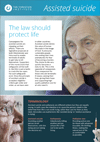The Government is planning changes to the law on assisted suicide to make it clearer that websites offering to help people kill themselves are acting unlawfully.
The news will come as a relief to pro-life groups who feared that Government plans to “modernise” the law, announced in the Queen’s Speech last month, would in fact weaken it.
Prime Minister Gordon Brown later said at the end of last year that he is “totally against” assisted suicide.
However, there are still concerns that backbenchers with pro-euthanasia views, such as Liberal Democrat MP Evan Harris, may attempt amendments to weaken the ban on assisted suicide when these new plans are debated.
The Government proposes to change the law to make clear that it still applies even if no specific suicide results from the person’s actions. Just intending to encourage or assist a suicide is enough to be caught by the offence.
A Government press release stated last September that: “The law on assisting suicide is to be simplified to increase public understanding and reassure people that it applies as much on the internet as it does off-line”.
The Director of Public Prosecutions, Keir Starmer, last month said that he had enough evidence to prosecute a couple who took their son to a Swiss suicide clinic to end his life.
However, he decided that a prosecution would not be in the public interest. In a recent public interview he hinted that such cases would be met with a similar approach in future.
Lord Carlile of Berriew QC warned against weakening the law on assisted suicide last year: “Laws aren’t like precision-guided missiles. Once a statute, they can quickly be used to encourage acts they were designed to enable and control.
“It’s easy enough to draft safeguards in the comfort of Westminster, but laws have to be real-world-proofed.”
A spokesman for the British Medical Association, Dr George Fernie, recently indicated the organisation’s opposition to physician-assisted suicide.
He said: “People when they have a debilitating illness that may end their life are extremely vulnerable, they’re at a fragile stage.
“And our worry is they’re going to contemplate ending their life when that really isn’t their wish.”

